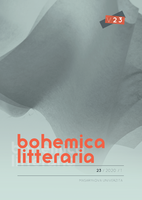Česká humoristická próza v období protektorátu
The Czech humoristic fiction in the era of the Protectorate of Bohemia and Moravia
Author(s): Erik GilkSubject(s): Czech Literature
Published by: Masarykova univerzita nakladatelství
Keywords: Czech literature; fiction; the Second World War; humoristic fiction
Summary/Abstract: The paper, having a summarizing character, deals with the rich production of Czech humoristic fiction published during the period of 1939–1945. The goal of the paper is to describe and classify all important works belonging to this literary genre and to establish their dominant types. Not considering writings by older, not significantly prolific authors (K. Poláček, J. John, K. Konrád), three such types can be determined. The largest category can be called books of folkish humor; their stories are located in specific regions or settlements, and their inhabitants speak in a dialect (F. Zýbal, J. Obrovský, O. Bělecký, A. V. Procházka, R. Kynčl; better-than-average J. Š. Kubín and F. Rachlík). The second type comprises of small-town satires, which had retained their popularity in Czech literature from the preceding period. In this case, main characters are situated in their family set in a professional or urban milieu. The story always criticizes negative attributes of the characters (J. Žák, M. Jíra, V. Kaplický, V. Neff, V. Svatá, V. Šmejc, O. Hanuš). The last distinctive group is proses which use artistic techniques, such as slapstick and crazy comedies of foreign-language literatures, especially the Anglo-American one (Z. Jirotka, F. Vavřincová, J. Gruss, M. Bílý). Moreover, there are two superior authors of this period whose works do not fit in any of these three types: J. Danda a V. Donát.
Journal: Bohemica litteraria
- Issue Year: 23/2020
- Issue No: 1
- Page Range: 35-55
- Page Count: 19
- Language: Czech

